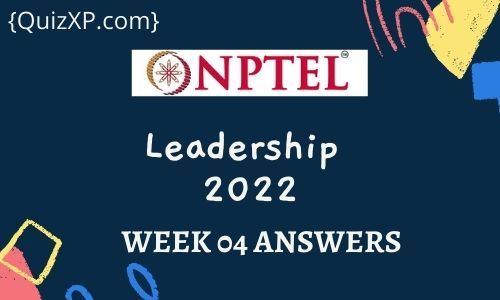Are you looking for the Answers to NPTEL Leadership Assignment 4? This article will help you with the answer to the National Programme on Technology Enhanced Learning (NPTEL) Course “ NPTEL Leadership Assignment 4 “
What is Leadership?
The concept of leadership has been employed within different context and at different levels of analysis e.g. self-leadership, small-group leadership, organizational leadership and national leadership. The primary purpose of this course is to serve as a catalyst for the students of leadership’s thinking and dialogue about leaders and the process of leadership.
CRITERIA TO GET A CERTIFICATE
Average assignment score = 25% of the average of best 4 assignments out of the total 4 assignments given in the course.
Exam score = 75% of the proctored certification exam score out of 100
Final score = Average assignment score + Exam score
YOU WILL BE ELIGIBLE FOR A CERTIFICATE ONLY IF THE AVERAGE ASSIGNMENT SCORE >=10/25 AND EXAM SCORE >= 30/75. If one of the 2 criteria is not met, you will not get the certificate even if the Final score >= 40/100.
Below you can find the answers for NPTEL Leadership Assignment 4
NPTEL Leadership Assignment 4 Answers:-
Q1. The word “emotion” is derived from the __________ word ___________ which means to “stir up” or “to excite”
a) Greek, emovore
b) Latin, emovore
c) French, emover
d) Sanskrit, emovra
Answer:- b
Q2. Emotional intelligence consists various characteristics except:
a) Self-awareness
b) Self-management
c) Self-justification
d) Self-Motivation
Answer:- c
Q3. Empathy is described as:
a) Knowledge of true feeling at the moment
b) Being able to feel what other feel and want
c) Ability to guide other emotions in the desired way
d) Handling one’s emotions to facilitate the task
Answer:- c
Q4. The term emotional intelligence was popularized in 1995 by psychologist and behavioral science journalist _________ in his book, Emotional Intelligence.
a) Peter Salavoy ad John Mayer
b) Dr. Daniel Goleman
c) Gill Hasson
d) Howard Gardner
Answer:- b
Q5. Identify the key characteristics of Emotional Intelligence:
a) Efficient in problem solving
b) Better interpersonal relationships
c) Ability to think abstract ideas
d) Good sense of humour
Answer:- b
???? Next Week Answers: Assignment 05 ????
Q6. In a team, leader’s role is:
a) More directive and less facilitative
b) More facilitative and less directive
c) Equally facilitative and directive
d) Neither facilitative not directive
Answer:- b
Q7. The distinguishing feature of the team, which differentiate it from group is:
a) Combination of people with expertise in their domain.
b) Team consists a leader that motivate its followers.
c) Team creates synergy through its members’ joint efforts.
d) Joint accountability of all team members
Answer:- d
Q8. Identify the correct match:
| 1. Liason with external constituencies | A. Facilitates and meditates in conflict resolution |
| 2. Trouble shooter | B. Helps in resolving problems |
| 3. Conflict Managers | C. Upper management, other internal teams, customer suppliers |
| 4. Coaches | D. Clarify expectations, and roles, teach, offer support and help team members |
a) 1A, 2B, 3D, 4C
b) 1A, 2C, 3D, 4B
c) 1C, 2B, 3A, 4D
d) 1B, 2C, 3D, 4A
Answer:- c
Q9. Emotional intelligence affects various facets of life except:
a) Performance at school or work
b) Interpersonal relationships
c) Arithmetic intelligence
d) Social intelligence
Answer:- c
Q10. Self-management is defined as when one is able to:
a) Recognize their own emotions and their impact on thoughts and behavior
b) Control impulsive feelings and behavior, handle emotions in healthy way
c) Have and use empathy in order to understand the emotions and needs of other people
d) Develop and maintain good interpersonal relationships
Answer:- b
Q11. To ensure minimization of unethical behaviour, organizations need to develop
a) Ethical codes of conduct
b) Self-regulatory practices
c) Training for ethical senstivity
d) All of the above
Answer:- d
Q12. Identify the components which is not related to Path-goal theory:
a) Leader behavior
b) Subordinate characteristics
c) Task characteristics
d) Empowerment
Answer:- d
Q13. According to three skills approach by Katz, which skill is least required at top level of management?
a) Human
b) Technical
c) Social
d) Conceptual
Answer:-b
Q14. Which one among the following does not belong to competencies according to three skill model?
a) Problem solving skills
b) Motivation skills
c) Knowledge
d) Social judgement skills
Answer:- b
Q15. In context of Skill approach, identify the untrue:
a) It provides a way to delineate the skills of a leader
b) Skills model includes individual attributes that are trait-like
c) It is second approach to conceptualize and create a structure of the process of leadership around skills after situational theory of leadership
d) It provides a structure consistent with leadership education programs
Answer:- c
For Internship and job updates:- Visit
Disclaimer: We do not claim 100% surety of answers, these answers are based on our sole knowledge, and by posting these answers we are just trying to help students, so we urge do your assignment on your own.
if you have any suggestions then comment below or contact us at [email protected]
If you found this article Interesting and helpful, don’t forget to share it with your friends to get this information.


